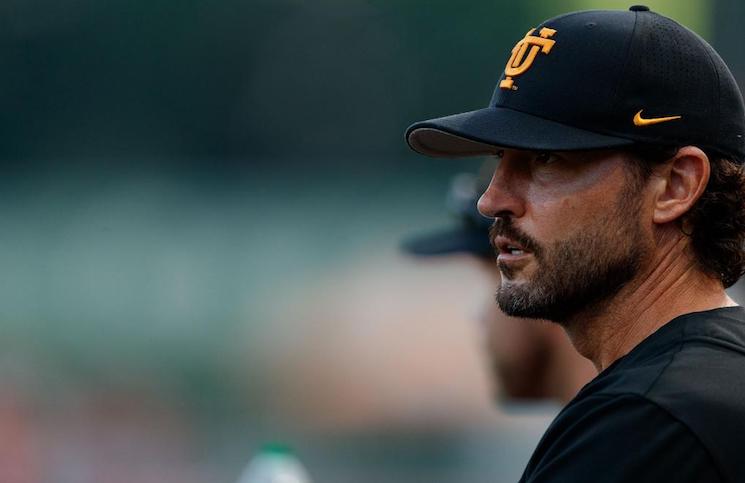
Two things can be true at once: You can be proud of what this Tennessee men’s basketball team accomplished and think they put together a season that likely ranks in the top three in modern program history, and you can be frustrated and disappointed by another season ending short of the program’s first-ever Final Four.
I desperately wanted Zakai Zeigler’s Tennessee career to end with a historic bang. While he and Jahmai Mashack both ended their four-year Tennessee careers with more team accomplishments than any other four-year UT players have, neither got to help the Vols hang a Final Four banner in Thompson-Boling Arena. Zeigler will go down as arguably the best point guard in Tennessee history, leaving UT with several school records under his belt. Both he and Mashack are just as loved for what they’ve done off the court in the last four years as they are for what they’ve done on it, and they’re the only pair of Tennessee teammates to ever lead the Vols to back-to-back Elite Eight appearances.
But just like so many seasons before this one, Tennessee’s 2024-25 campaign ended with a “but” instead of a “first.”
This season was a successful one for the Vols by just about every measure. It was only the third time in program history UT won 30 or more games in a season, they were the No. 1 team in the country in the AP Poll for a program-record five consecutive weeks, it was the second-consecutive season where the Vols had the SEC Defensive Player of the Year and a player earn a Naismith national award for being the best player at their respective position, and it was only the third time in program history UT made it to an Elite Eight.
But.
For the 27th time, Tennessee ended their NCAA Tournament journey without reaching a Final Four. They’re one of just six programs across the country to have appeared in at least 25 NCAA Tournaments without making it to a Final Four. This season marked the second-straight year where the Vols’ season came to an end at the hands of a one-seed that ended up making it to the national championship game.
I can appreciate the journey this team took to get to where they did, though. Because by all accounts, they probably shouldn’t have made it as far as they did in the NCAA Tournament and probably shouldn’t have had as much overall success as they did.
Judge Me by My Size, Do You?
Tennessee’s roster heading into this season looked like a good one, but there were already questions and holes when you looked at how it was constructed. Then attrition hit a roster that was already thinner than most, with forward JP Estrella undergoing season-ending surgery after only playing the first three games of the season, and guard Cameron Carr abruptly leaving the program right before Christmas.
Within the span of a month, Tennessee went from an already small 11 scholarship players down to a scant nine, and Darlinstone Dubar missed several games early on as he worked through grief and mental health struggles stemming from the sudden deaths of his grandmother, best friend, and father within a 10-day stretch just a few months prior.
The Vols operated most of this season playing mostly just eight guys regularly, and there was even a game this season when Tennessee only had seven scholarship players available due to Zakai Zeigler suffering an injury and Igor Milicic dealing with illness. That game served as a microcosm of the season, though, as the Vols somehow didn’t just beat No. 5 Florida, but blew them out by 20 points in Knoxville despite the majorly shorthanded bench.
When you consider the diminished roster size, the fact that UT had just three true posts, and that they played in the toughest and best men’s basketball league this season, it would be reasonable to expect them to be a middling SEC team.
Instead, they finished as one of the four best teams in the SEC, made it to the SEC Tournament title game for the fourth time in the last seven years, and earned a two-seed in the NCAA Tournament.
Here’s where the frustration comes in, though.
Again, this team probably had no business making it as far as they did this season based on everything I said above. But when you have arguably the best point guard in school history, an elite shooter who breaks a school record for most threes made in a season, and the best head coach in your program’s history, you’re capable of accomplishing more than people expect.
Even still, the Vols got to the Elite Eight, and once again, they failed to make it to the Final Four.
It didn’t quite feel like “Final Four or bust” this season, but when you’re closing out the career of a player who is on your program’s Mount Rushmore, you’d really like to make that ending something special. Even if the odds were, as usual, not in your favor.
A History of “Almost, But Not Quite”
I think it’s worth noting that, until recently, Tennessee men’s basketball didn’t have much in the way of NCAA Tournament history. If the selection process had been different and more expansive in the 1960s and 70s, then Ray Mears absolutely would’ve had more NCAA Tournament appearances and wins, and Tennessee is probably thought about differently historically. But that isn’t the case, and UT had just eight NCAA Tournament appearances prior to 1985 when the tournament expanded to 64 teams, birthing the modern era of the NCAAT.
From 1985 and up until Rick Barnes’ first tournament berth in 2018, Tennessee played just 26 NCAA Tournament games in the 33 tournaments between 1985-2017 and went 14-12 in those games. That’s an average of less than one tournament game per year, and 18 of those 26 games came within a nine-season stretch between 2006-14.
Over the last seven NCAA Tournaments, the Vols have appeared in all of them and have played in 19 games, going 12-7. That’s almost three NCAA Tournament games a season, and Barnes’ 12 NCAA Tournament wins are more than any head coach in program history and are almost as many wins as Tennessee had as an entire program from 1985-2017.
What’s even crazier to think about is that Tennessee didn’t have even an Elite Eight appearance to their name until 2010, which means all three of the Vols’ Elite Eights have come in the last 15 years. When you think of appearing in three Elite Eights in a 15-year stretch, it doesn’t sound so bad. But that ignores the 30-40 years prior where the program had only gone as far as the Sweet Sixteen and had only done that four times between 1981 and 2008.
I mentioned earlier that Tennessee is one of just six programs to have 25 or more NCAA Tournament appearances without a Final Four. Only BYU (32), Xavier (30), and Missouri (29) have more NCAAT appearances without making it to the Final Four than the Vols, meaning UT has the fourth-most NCAA Tournament appearances without a Final Four in the country.
Tennessee is one of just seven D1 schools with at least three Elite Eight appearances without a Final Four. Their 11 Sweet Sixteen appearances are the most of any school without advancing to a Final Four.
This season’s ending wasn’t unique to this team. It isn’t uniquely a “Rick Barnes problem,” either. This has been a recurring theme of Tennessee men’s basketball for the entire program’s existence.
That history of being “oh-so-close” really only adds to the frustration for the end of this season, but it should provide some context, too. It’s not like Tennessee is a school like Indiana, where they’ve historically been a prominent program but haven’t made it to the Final Four in almost 25 years. Tennessee is a school whose NCAA Tournament history has basically been written within the last 30 years, with 18 of their 27 NCAA Tournament appearances occurring between 1998 and 2025. All but two of Tennessee’s 11 Sweet Sixteens have come in the last 25 years.
It took the Vols five tries in the Sweet Sixteen before they finally broke through to the Elite Eight on their sixth attempt. Hopefully it doesn’t take that many Elite Eight appearances before they can finally get over that hump, too.
Entering a New Era
As one door closes on Tennessee basketball, another one always opens. And I’m already liking what I see on the other side of this door.
Rick Barnes and his staff are tasked with retooling almost the entire basketball roster this offseason, with major departures hitting all at once. Gone are Zakai Zeigler, Jahmai Mashack, Chaz Lanier, Jordan Gainey, Igor Milicic and Darlinstone Dubar. Tennessee is set to return just four scholarship players from this year’s team, and they’re losing the heart and soul of the program in Zeigler.
This marks the end of the second distinct era of Rick Barnes’ time at Tennessee. The first was the PB&J Era with Grant Williams and Admiral Schofield (and Jordan Bone), and this second era was the Zakai Zeigler Era. Between those two was a rebuilding year, with Josiah-Jordan James and Santiago Vescovi taking the culture torch from the first era and serving as the bridge between the two eras.
Right now, there is no apparent “bridge player” who looks set to carry the mantle into the next era of Barnes basketball at Tennessee, but that doesn’t mean there isn’t room for optimism for what’s coming.
Tennessee has a good core of freshmen coming in with four-star guard Amari Evans, four-star forward DeWayne Brown and three-star point guard Troy Henderson. And in the last week, Tennessee has already started strong in the transfer portal, nabbing arguably the top point guard transfer in this cycle in Ja’Kobi Gillespie along with Jaylen Carey, a bruising forward from Vanderbilt who has two years of eligibility left.
My two cents: Gillespie is about as perfect of a point guard you could ask for at Tennessee to carry the torch after Zakai Zeigler. He won’t be at the program-defining level Zeigler was, but his blend of basketball IQ, shooting prowess, and tenacious defense should help him fit in perfectly at UT.
Then you add in Carey and a handful of shooters along with who all is already on the roster, and the 2025-26 Vols should continue to be right in the mix for some postseason fun.
To borrow an analogy from a different sport: Tennessee just needs to keep getting to the plate and give themselves more opportunities to hit a home run. The more plate appearances they get, they’ll eventually run into a pitch and drive it deep. One good swing — and some luck — and this program is more than capable of making their first Final Four in the next few years.
This season ended in disappointment, but it wasn’t a disappointing season. That won’t continue to be the case if this program continues to fall short over the next few years, but there’s an old saying that I’ve gotten pretty good at repeating:
“There’s always next year.”




